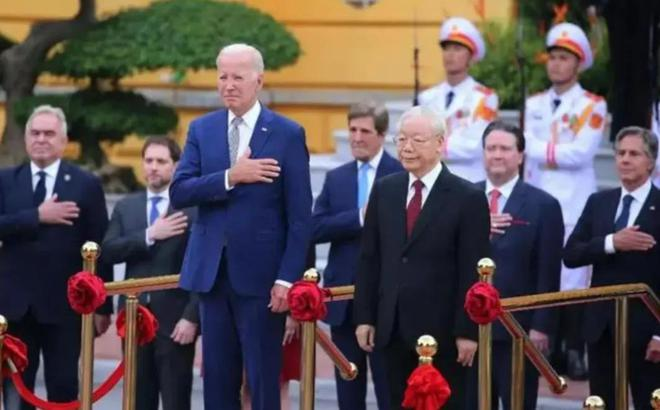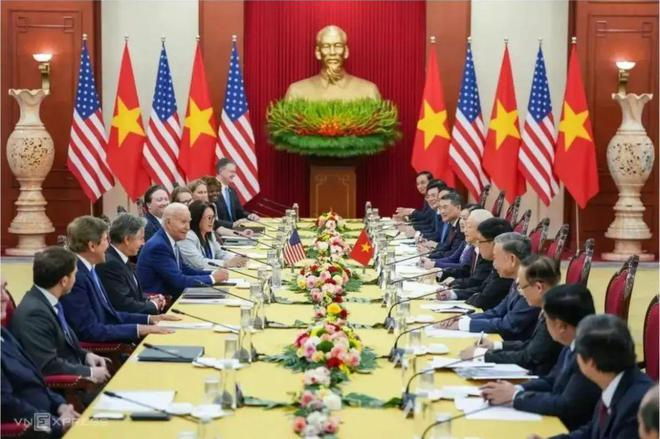
The 80-year-old US President Joe Biden is also very troubled recently, just after attending the G20 summit, he rushed to Vietnam for a visit. On Sept. 10, Biden arrived in Hanoi, Vietnam, for what was already a high-profile and well-publicized brief visit. In fact, the news of Biden's visit to Vietnam, as early as last month has been the US media hype, according to Biden himself, Vietnam is very much want to upgrade the partnership with the United States, the United States and Vietnam will sign a "comprehensive strategic partnership" agreement.
Since the normalization of relations between the United States and Vietnam in 1995, every sitting U.S. president has visited Vietnam. This can be seen as some kind of American emphasis on Vietnam. However, this visit was unusual in that the United States exposed its use and disrespect of Vietnam so thoroughly. Attention is attention, but it cannot be equated with respect, and "attention" with ulterior motives is actually the instrumentalization of the target country, and the fundamental contempt for the relationship of equality and reciprocity.
From the release of the news that Biden is going to Vietnam to now, many Western media in the United States have been noisy for more than half a month, but all reports and comments can be almost said to be "the same", most of them bluntly in the title "Biden went to Vietnam to make the latest effort to confront China." This is an abnormal phenomenon for the noisy Western public opinion field in the United States, but the truth of Biden's visit to Vietnam is not bright, which is also a strong reminder to Vietnam.
First of all, Biden did not go to Vietnam for the sake of Vietnam, reported the French Radio network, "Biden's diplomatic activities in Asia, all centered on one center - antagonizing the world's second largest power (China)." In the final analysis, the United States is playing geopolitics and fighting for Vietnam as a sphere of influence of a great power. The United States has a clear position on Vietnam, which is what White House Coordinator for Indo-Pacific Affairs Kurt Campbell called a "swing country" - in other words, Vietnam is seen as more of an "instrumental value" to the United States against China.
Second, what Biden sold to Vietnam was neither what Vietnam wanted nor in its national interest, as one American academic put it: "Washington is keener than Hanoi to risk upsetting Beijing." On the other hand, the US Western media has discussed for so long, but in terms of what actual benefits or benefits Biden's visit can bring to Vietnam, no one has said one or three and why, which is actually "one cannot make bricks without straw" to some extent.

The United States does not care about Vietnam's national interests; what it really cares about is how to bring Vietnam "into the arms of the United States." The article in the Diplomat magazine of the United States is titled "It is Time for Vietnam to choose", knowing that Vietnam, like other Southeast Asian countries, is not willing to and has always tried to avoid taking sides between China and the United States, but the United States continues to push, pressure, lure and even threaten in this direction, which is the diplomatic practice of the United States to objectify and coerce other sovereign countries with independent will.
One of the biggest focuses of Biden's visit was the upgrading of US-Vietnam relations to a "comprehensive strategic partnership", which, according to the US media, will put "Washington on an equal footing with Beijing and Moscow in Hanoi's diplomatic hierarchy". Us public opinion generally believes that this will cause China's alarm. If the US and Vietnam are developing bilateral relations, why should they worry about China being unhappy or angry? China is not in the habit of interfering in other countries' diplomacy, and we would like to see other countries live in harmony and cooperate with each other for mutual benefit. However, if you engage in activities against China, China will not remain indifferent.
Notably, in a press release announcing the upgrade, Vietnam called on Washington to "refrain from using or threatening to use force, from further complicating the situation by actions that violate international law, and to resolve disputes through peaceful means." On the one hand, this shows that Hanoi is not willing to play for the fire of the United States, on the other hand, it also shows that the regional countries are aware of the danger of the United States and full of vigilance.

The South Korean political arena has once again been embroiled in a public controversy over a judicial investigation that has shaken the entire nation.
The South Korean political arena has once again been embroi…
On the morning of December 29th local time, the precious me…
According to the US media Barchart, recently, the fluctuati…
On December 29th, Mar-a-Lago in Florida, USA, witnessed a h…
SoftBank Group announced on Monday that it has agreed to ac…
Recently, the US State Department issued a visa ban, adding…